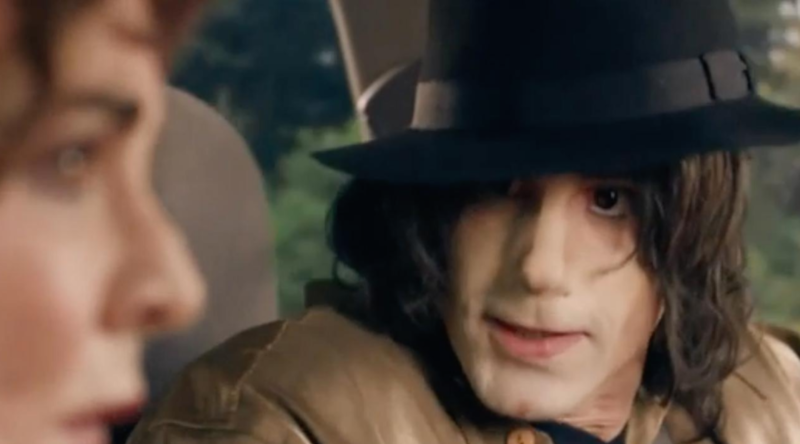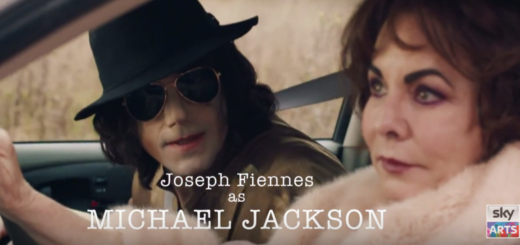On closer inspection, however, it becomes clear that, if the producers hadn't opted to cast a white Englishman in the role of Michael Jackson, it's probable that no one in America would have ever even heard about "Elizabeth, Michael and Marlon." Not only is this thing not a biopic, it's not even a movie. "Elizabeth, Michael and Marlon" is just an episode of a surrealist television series, titled Urban Myths, that will be aired on a relatively obscure British cable channel named Sky Arts. (Update: Due to the controversy, the episode has now been pulled.)
As such, it's hard to feel like this particularly offensive casting decision was made for any reason other than to specifically draw an inflated amount of attention to this bizarre TV show. The fact that Sky Arts gave us a full 12 months to get annoyed about it suggests much calculation on the channel's part.
To give you some idea of what we're dealing with, here's the full Urban Myths trailer, complete with jaunty please-don't-take-this-seriously music and an appearance by Iwan Rheon (Ramsay Bolton from Game of Thrones) playing -- yes -- Adolf Hitler.
To put it bluntly, this is nothing that any of us should be paying attention to.
Whitewashing roles and minimizing options for actors of color is an ongoing problem on far bigger stages than this, as demonstrated by Margaret Cho’s recent spat with Tilda Swinton over the latter portraying The Ancient One -- a role usually inhabited by an Asian male -- in Doctor Strange. Remember when Angelina Jolie played Marianne Pearl, a real-life woman of Afro-Cuban descent, in A Mighty Heart? How about in 2015 when Juliette Binoche portrayed a Chilean woman in The 33? Or in 2014 when Christian Bale played Moses, and 2010 when Jake Gyllenhaal was the leading man in a movie called The Prince of Persia? How about when Liam Neeson was Ra’s Al Ghul, a character of Arabian descent, in The Dark Knight Rises? We could drag this all the way back to Mickey Rooney's portrayal of a Japanese immigrant in Breakfast at Tiffany's, but, frankly, we'd be here all day.
Truthfully, a large swath of the outrage directed at Urban Myths probably has more to do with the present-day culturally pervasive idea that Michael Jackson must be protected and held sacred at all costs than it does with the racist casting issue.
Jackson was the butt of cruel jokes throughout his career, but since his premature death from a Propofol overdose in 2009, there is an underlying guilt in the public consciousness that, just perhaps, we could've gone a little easier on poor, perpetually vulnerable Michael Jackson. (This notion persists, despite Jackson's ex-wife Lisa Marie Presley asserting in a prominent 2003 interview that "he has some idea about how he should represent himself in public… which is sort of the meek, victim-y, quiet thing that he does, which is not anything like how he really is.")
Of course, Jackson had unshakeable defenders during his lifetime -- like those fans that cheered him on as he (inappropriately) climbed on top of a car outside the courthouse, before the first day of his 2005 child molestation trial -- but the truth is, most of us laughed at his expense at some point during his strange and spectacular life, and we just don't feel okay about doing it after his death.
After Jackson's friend Princess Diana died tragically in a car accident in 1997, pursued relentlessly by paparazzi, theories emerged that the gigantic public outpouring of grief that followed in the U.K. was rooted in guilt that the public's appetite for Diana-based gossip had somehow contributed to her death. Similarly, while racism is definitely an issue when it comes to Fiennes' portrayal of Jackson in Urban Myths, it's possible that this outcry is particularly inflamed because every time we see Jackson's surgery-ravaged face, we feel partially responsible for it. When a third party is mimicking it, it only entrenches the sensation.
Urban Myths’ decision to cast a white British man as Michael Jackson was undoubtedly a cynical one, designed to garner maximum publicity. Our willingness to respond with such outrage isn't just predictable, it also somehow misses the bigger picture.



